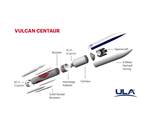Northrop Grumman completes rocket motor validation test for Vulcan Centaur
The 63-inch-diameter graphite epoxy motor (GEM 63XL) was developed in partnership with United Launch Alliance to provide the rocket with additional lift capability.

Photo Credit: Northrop Grumman
It was reported on Jan. 21 that Northrop Grumman Corporation (Falls Church, Va., U.S.) conducted the validation ground test of an extended length 63-inch-diameter graphite epoxy motor (GEM 63XL) in Promontory, Utah. This variation of the company’s GEM 63 strap-on booster was developed in partnership with United Launch Alliance (ULA, Centennial, Colo., U.S.) to provide additional lift capability to the Vulcan Centaur rocket.
“This new motor optimizes our best-in-class technologies and leverages flight-proven solid rocket propulsion designs to provide our customers with the most reliable product,” says Charlie Precourt, vice president, propulsion systems, Northrop Grumman. “Evolving the original GEM 63 design utilizes our decades of GEM strap-on booster expertise while enhancing capabilities for heavy-lift missions.”
During the static test, the motor fired for approximately 90 seconds, producing nearly 449,000 pounds of thrust to validate the performance capability of the motor design. Additionally, this firing verified the motor’s internal insulation, propellant grain, ballistics and nozzle in a hot-conditioned environment.
Northrop Grumman has supplied rocket propulsion to ULA and its heritage companies for a variety of launch vehicles since 1964. The GEM family of strap-on motors was developed starting in the early 1980s with the GEM 40 to support the Delta II launch vehicle. The company then followed with the GEM 46 for the Delta II Heavy, and the GEM 60, which flew 86 motors over 26 Delta IV launches before retiring in 2019. The first GEM 63 motors supported ULA’s Atlas V rocket in November 2020.
Related Content
-
Cutting 100 pounds, certification time for the X-59 nose cone
Swift Engineering used HyperX software to remove 100 pounds from 38-foot graphite/epoxy cored nose cone for X-59 supersonic aircraft.
-
Testing to support composite bolted joint analysis
An overview of ASTM Standard Guide D8509, and its coupon-level mechanical testing of design properties for analyzing composite bolted joints.
-
Bladder-assisted compression molding derivative produces complex, autoclave-quality automotive parts
HP Composites’ AirPower technology enables high-rate CFRP roof production with 50% energy savings for the Maserati MC20.



